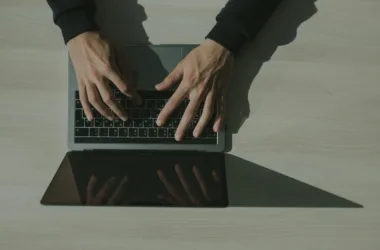Have you noticed how some candidates stay cool in interviews while others don’t? Knowing how to handle interview stress is key in today’s job market. It’s not just staying calm; it’s a careful plan to beat interview nerves. This can truly make a difference in how you do. Employers look for those who can handle stress well. They value emotional strength and the ability to adjust—traits everyone wants in their team.
To get ready for interviews, it’s important to understand what stresses you. Find out what makes you nervous and learn how to deal with it. This boosts your confidence and improves your chances of getting the job. Here, we’ll talk about real steps you can take. The goal is to stay calm even when it’s tough.
The Importance of Composure During Interviews
Keeping calm during interviews is crucial. Those who stay cool under pressure really stand out. It shows they’re ready for challenges at work. Being composed lets you answer questions well. This means you won’t get upset or confused easily.
About 73% of people get nervous when looking for a job or preparing for an interview. This shows how important staying calm is, especially for tech jobs with a 42% rejection rate. Anxiety often comes from fearing surprise questions or the pressure to get the job. By preparing well for interviews, you can feel more confident.
Those who stay calm are 45% more likely to get job offers. Having a daily routine helps you handle stress better. Getting support from others can make you 48% happier. This shows working together helps you deal with tough situations.
Making a career plan can boost your interview performance. Knowing a lot about the company and job helps lower stress. Using visualization techniques also helps get you in the right mindset. Staying calm during interviews gives you a big advantage. It helps you do better and could lead to getting ahead in your career.
Understanding Interview Stress
Interview stress is the nervousness you feel before or during interviews. This stress can make you anxious and affect how well you do. It’s important to understand what interview stress definition means to deal with these tough times better.
Defining Interview Stress and Its Sources
The reasons for stress sources in interviews are different for everyone. You might worry about not getting the job, how you’ll be judged, or dealing with questions you’re not used to. Feeling pressure from wanting to do well, the tough job market, or economic issues can also stress you out. Knowing what makes you stressed is the first step to feeling better and doing your best.
The Impact of Stress on Performance
The way stress impact shows up in interviews can really change things. Being very anxious can mess with your thinking, make it hard to remember things, and affect your choices. You might sweat, have a shaky voice, or not be able to relax. This can make you less confident. A lot of people feel these interview anxiety effects and can’t show off their skills. But if you tackle stress early, you can do better in interviews and really impress employers.
Identifying Stress Triggers in Interview Scenarios
Knowing what stresses you out in interviews is key to doing better. Things like tough questions, not being ready, and watching the clock can trip you up. Most employees find interviews to be stressful situations because of the need to impress and being closely watched.
Taking a look back at previous interviews helps spot what makes you nervous. By figuring out stress triggers, you can get better at handling nerves. Assessing yourself helps find these triggers, leading to smarter prep. Think about:
- How past interview settings made you feel.
- Questions that made you react emotionally.
- What prep worked and what didn’t.
Talking about how you deal with stress is something employers might ask. Be real about how you stay cool and share stories of overcoming interview triggers. Talking about how you’ve grown through stress appeals to interviewers.
Interviews can make us feel both good and bad stress. Knowing managing anxiety is a sign to get good at handling it. Showing how you meet deadlines and use stress as a push can impress, turning weaknesses into strengths.
Strategies to Maintain Composure
Maintaining composure during interviews is key to making a good impression. Candidates can use mindfulness and visualization to lessen anxiety and show their best selves. These methods help keep a positive mindset, improving performance.
Practicing Mindfulness and Breathing Techniques
Mindfulness is great for calming nerves before and during interviews. Deep breathing exercises can also help with relaxation and managing stress. Here are ways to use these techniques:
- Controlled Breathing: Breathe in deeply through the nose, hold it, then breathe out through the mouth. Do this for a few minutes to feel more relaxed.
- Grounding Techniques: Pay attention to your surroundings or how your body feels. This helps keep your mind focused and lessens distractions.
- S.T.O.P Method: Stop, take a breath, look around, and proceed with more awareness. About 63% of people find this method effective in stressful situations.
- Physical Activity: A quick walk or some light exercise can ease tension. 87% of people say this works for them.
Visualizing Success Before the Interview
Visualizing success can prep your mind for a great interview. It involves picturing a positive interaction and feeling confident. Here’s how to do it well:
- Imagine Success: See yourself answering questions confidently and connecting with the interviewer.
- Project Positive Outcomes: Think not just about answers but also about succeeding in the interview, which boosts confidence.
- Use Affirmations: Combine visualizing with positive sayings to support a good mindset.
- Preparation Rituals: Mix in visualization with research and practice. About 72% of interviewees find this mix helpful.
Preparing for the Unexpected During Interviews
In the job interview world, surprises are common. Nearly half the candidates get a question meant to see how quickly they can think. It’s important to get ready for these moments if you want to do well.
Being adaptable in an interview means thinking flexibly. Expect unexpected questions and technical problems when talking to future employers. There are a few ways to become more adaptable:
- Maintain an optimistic outlook. Seeing surprises as chances helps lessen worry.
- Prepare a backup plan for distractions. Have a way to deal with sudden interruptions or odd questions.
- Practice with a friend. Acting out different situations can help you stay calm and boost confidence when surprises come.
- Research the company thoroughly. Knowing about the company’s culture and field helps answer tough questions better.
Since 93% of people looking for jobs feel nervous about interviews, using these tips can help you do better. Experts suggest getting help from places like college career centers. They offer advice on what questions you might get and how to answer them, which can make you less anxious.
Using methods like the STAR technique can also help when answering hard questions. It’s good to keep a list of what you’re good at and what you’ve achieved, too. Being ready for anything helps you succeed in interviews.
Dealing with Challenging Interview Questions
Dealing with tough interview questions can be very stressful. Some questions like “What is your biggest weakness?” or “How do you handle criticism?” can make you feel on the spot. You have to think fast and answer with confidence. Getting ready for these questions can really help you give better answers during interviews.
Common Stressful Questions Employers Ask
- “Tell me about a time when you failed.”
- “What motivates you?”
- “What is your biggest weakness?”
- “Where do you see yourself in five years?”
- “Tell me about yourself.”
- “Why did you leave your last job?”
Employers ask tough questions to see what you value, how you think, and if you can stay calm under pressure. They might ask about how you solve problems creatively or handle emergency situations. These questions check more than just your skills. They see if you can be confident when things get tough.
Techniques for Crafting Confident Responses
Using good strategies for interview answers can help you make a strong impression. A great way is the STAR technique, where you layout your answers like this:
- Situation: Describe the context.
- Task: Explain what your responsibility was.
- Action: Detail the steps you took to address the issue.
- Result: Share the outcome of your actions.
This method helps you explain your answers clearly and shows you’re resilient and can think critically. When talking about weaknesses, talk about a challenge you overcame. This shows growth and self-knowledge. Make sure your answers match the company’s goals and share experiences that are relevant to the job. This will make you a stronger candidate and help build confidence in your skills.
The Role of Body Language in Composing Yourself
Body language matters a lot in interviews. It shapes what interviewers think of you. Non-verbal signals can change the interview’s result. Observers use these hints to judge if you’re confident and right for the job. Things like eye contact, a firm handshake, and open posture show you’re involved and confident.
Understanding Non-Verbal Cues
Studies show body language makes up 55% of how we’re seen. In comparison, spoken words are at 7% and how we sound is 38%. A firm handshake shows confidence, but a weak one can seem like you’re nervous. Standing straight is key; slumping may look like you don’t care. Being upright but relaxed shows you’re engaged. Keeping eye contact shows you’re interested. Looking away might seem like you’re not comfortable or interested.
How to Project Confidence Through Posture
Posing confidently can change how stressed you feel. Standing tall and managing your facial expressions can make you seem confident. A true, warm smile makes interactions better. It builds a nice connection. Try not to fiddle with things like pens to look keen and concentrated.
Interview Stress: The Importance of Self-Management
In interviews, knowing how to manage personal stress is key. Many people feel very anxious during interviews. Yet, a little stress can actually make you more alert and focused. It’s crucial to find out which stress-busting methods suit you best. This could be exercise, mindfulness, or deep breathing. These tactics help control your emotions, making self-management crucial in interviews.
Identifying Personal Stress Management Techniques
It’s important to know what makes you stressed and how to handle it in interviews. Creating a routine that includes exercise or relaxation before interviews can calm your nerves. Using simple techniques like taking a pause to sip water helps too. These breaks allow you to collect your thoughts. Many find that knowing their emotional triggers before and during an interview boosts their confidence when facing surprises.
Maintaining Emotional Awareness Throughout the Process
Being aware of your emotions helps you stay calm during interviews. It’s about keeping track of your feelings and using coping methods when stress gets too high. Practicing mindfulness, for instance, helps keep your focus and emotions in check, even under pressure. Making time for self-reflection and being well-prepared can improve your interviewing skills. It helps you respond thoughtfully and calmly, raising your success rate.
Conclusion
In conclusion, job interviews can be a source of great stress and anxiety for many individuals. The pressure to perform well, make a good impression, and demonstrate their qualifications can feel overwhelming. However, it is essential to remember that interview stress is a normal part of the process and can be managed effectively.
One of the key strategies to combat interview stress is preparation. By thoroughly researching the company, understanding the job requirements, and practicing potential interview questions, candidates can boost their confidence and reduce anxiety. Additionally, taking care of one’s physical and mental well-being through exercise, adequate sleep, and relaxation techniques can help alleviate stress before the interview.
Another important aspect is reframing the perspective on interviews. Instead of approaching them as a judgment of personal worth, viewing interviews as opportunities for growth and learning can lessen the burden. Recognizing that every interview, successful or not, provides valuable experience and feedback can help individuals bounce back stronger and more prepared for future opportunities.
In summary, while interview stress is natural, it is crucial to adopt effective strategies to manage it. Preparation, self-care, and a positive mindset are key elements in reducing anxiety and maximizing performance during interviews. Remember, a job interview is just a small part of the bigger career journey, and each experience can contribute to personal growth and professional development.






